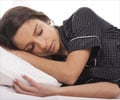Living in our modern environment contributes to late circadian timing regardless of season and a weekend camping trip can help get over it.

- Our modern exposure to electrical lighting causes about a two-hour delay in our internal clocks.
- With increased time spent outdoors, the sleep-inducing melatonin levels increased 2.5 times earlier than the usual bed time.
- Light exposure and reduced exposure to electronic lights alters the circadian clock and sleep pattern.
- If a person wants to go to bed at an earlier hour, then a weekend spent camping could be just the thing.
"Our findings demonstrate that living in our modern environments contributes to late circadian timing regardless of season and that a weekend camping trip can reset our clock rapidly."
An earlier study by Wright's team found that our modern exposure to electrical lighting causes about a two-hour delay in our internal clocks, as evidenced by a shift in the normal fluctuations of the hormone melatonin. They found that a week of summer sun shifted those internal clocks back, sending people to bed earlier, without changing how long they slept.
To find out the impact of camping on season changes from summer to winter and its effect on our internal clocks, researchers sent another group of five active people camping for a week in the chilly Colorado winter. They went right around the time of the winter solstice when the days were at their shortest--no flashlights or cell phones allowed--and watched what would happen to their sleep and hormonal rhythms.
The data suggest that our modern lifestyles reduce light exposure in the winter by a whopping 13 times. With increased time spent outdoors, people in the study started going to bed at a more reasonable hour. Their internal clocks, measured by the timing of when melatonin levels began to rise in their bodies, shifted more than 2.5 hours earlier. Their sleeping patterns followed these changes in melatonin levels and people went to sleep earlier.
The findings show that people are responsive to seasonal changes in daylight just as other animals are. While our modern conveniences may leave us out of sync, our clocks can be readily reset with light exposure.
"Our findings highlight an opportunity for architectural design to bring in more natural sunlight into the modern built environment and to work with lighting companies to incorporate tunable lighting that would be able to change across the day and night to enhance performance, health, and well-being," he says.
Reference
- Kenneth Wright et al., Trouble getting to sleep? Scientists say go camping, Current Biology (2017) http://dx.doi.org/10.1016/j.cub.2016.12.041.
Source-Medindia















